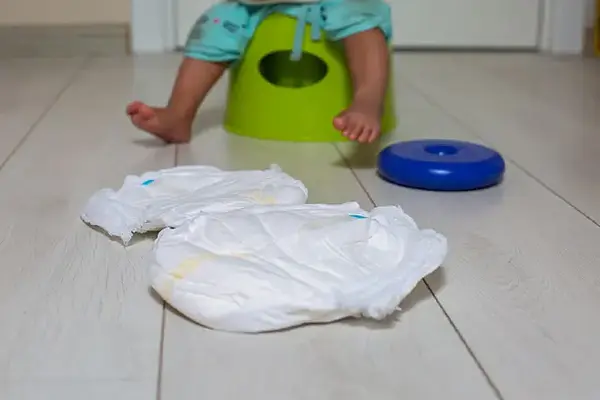Potty training is hard work, but it has a big payoff. You and your child will grow closer, they will feel more comfortable and confident, and you won’t have to change diapers anymore. Unfortunately, many parents get in the way of their child’s potty training success by making these five potty training mistakes. To set your child up for success and make the potty training experience the best it can be, read on to learn the mistakes many parents make and how to avoid them.
1. Starting Too Early
Every child is different, which means that every child will be ready to start potty training at their own “right time.” Some suggest starting potty training around ages 18-22 months, while others stress waiting for your child to show signs of being ready, regardless of age. Potty training too early can create a whole host of physical and emotional problems for your child. If you start too early, your child’s bladder might be underdeveloped, leading to accidents and urinary tract infections.
Training too early can also discourage healthy bathroom habits or encourage holding urine for prolonged periods of time to avoid having an accident in their underwear. These accidents are embarrassing and discouraging and can interfere with the success of your potty training efforts. Potty training too early can also put a strain on the parent-child relationship, putting pressure on your child to do something they are not ready to do and causing them to feel confusing emotions, like fear of letting their parent down or anxiety related to the task.
Because there is no “right time” here, starting too early means starting before your child is ready. Not only should you not start potty training too early, but you should avoid starting potty training in otherwise stressful times. During the holidays, for example, new people will be coming and going from your home frequently.
When you have a big project on the horizon, your focus will likely not be on the bathroom. Potty training will take a great deal of your time, attention, and energy, so before diving in, be sure that you have enough bandwidth to make it as successful as possible.
2. Having Unrealistic Expectations
A fundamental mistake many parents make when potty training their child is expecting that their child will be fully potty trained right away. Stories of potty training prodigies who gained their full bathroom independence in a single weekend often circulate throughout parenting groups.
If you hold your child to unrealistic expectations, you are setting yourself up for disappointment, and your child will feel your disappointment, discouraging them, and interfering with any potty training efforts.
The important thing to remember is that every child will have a different potty training experience, every child will have accidents and setbacks, and every child will get potty trained, eventually.
3. Punishing Your Child
Potty training is hard, and accidents are bound to happen before, during, and after you potty train your child. A major potty training mistake parents make is punishing their child for potty training mistakes or accidents. By shaming a child for something that is often outside of their control, like a bathroom accident at such a young age, you quickly destroy much of the potty training progress that has already been made and destroy your child’s confidence.
The more stressed, afraid, and worried your child is while trying to use the bathroom, the harder it will be for them to do it comfortably. Potty training is emotional for everyone involved. It is challenging, stressful, frustrating, and scary. It also has the potential to be an amazing experience that leaves your child feeling more confident than ever and proud of their accomplishments. By punishing your child for making a potty training mistake or having an accident, you effectively destroy the opportunity to make potty training an amazing experience.
Likewise, don’t punish your child if they express that they are not ready for potty training. Some parents will try to force their child to use the bathroom by sitting on the toilet. This just makes potty training more challenging, as it becomes a tense and high-pressure situation instead of something that your child is comfortable with and excited to attempt. Instead of punishing your child during potty training, acknowledge the situation and move on in an encouraging way.
4. Not Breaking It Down Enough
Potty training is a great opportunity to address all parts of bathroom etiquette, including the steps to using the bathroom and how to talk about using the bathroom. A mistake many parents make is not breaking down the potty training experience into bite-sized lessons for their child, as well as leaving out fundamental parts of the lessons.
Your child will be best served if you teach them all parts of the potty training process, including what words to use and how to wipe, flush, and wash their hands. Learning in this way and at this age will build lasting habits that your child can take with them when they use the bathroom independently at school, at other people’s homes, or even in their own home. By not breaking it down enough, you also risk instilling another type of anxiety in your child--feeling uncomfortable about talking about perfectly natural things, such as going to the bathroom.
5. Not Being Consistent Enough
Though some parents say that you can potty train a child boot camp style, successfully getting through the entire process in a single weekend, more than anything else, potty training is about consistency. Once your child gets the hang of how to use the bathroom independently, avoid accidents, and feel comfortable trusting their body’s signals, they will need continual reinforcement of these behaviors until a habit is formed.
Many parents see regression when they allow their child to wear pull-ups overnight rather than potty training underwear. Though changing sheets frequently can be frustrating, undermining the potty training lesson can set back all of the progress that has been made. The good news is, training underwear is very helpful to fill the transition between diapers or pull-ups and regular underwear because if your child has an accident, they will be able to tell even in their training underwear. It just won’t be as messy. This is a really helpful way to stay consistent.
Continually working toward potty training goals even when life events like going on vacation or visiting someone else’s home are occurring can help reinforce consistency throughout the potty training experience and beyond.
.webp)





